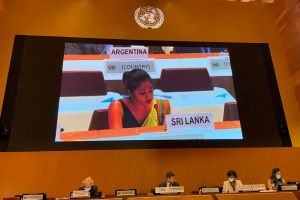
Mr. President,
Since this is the first time my delegation takes the floor during your presidency, allow me at the outset to congratulate you on the assumption of the presidency. You can count on our full support.
We thank the distinguished panelists for their valuable `insights into this timely discussion on Women and International Security.
Mr. President,
We repeat among ourselves at each session that the CD is the sole multilateral disarmament negotiating forum. Yet, regrettably, we have not been successful in reaching consensus on a Programme of Work, let alone the negotiations.. Irrespective of the CD’s lack of progress, the world outside keeps moving and the already fragile international security situation is taking a turn for the worse. Trust in multilateralism is challenged and there are concerns on the return of strategic competition among military powers. It is in these worrying circumstances that we welcome this session on ‘Women´s participation and role in International Security, a discussion that will shed light on an important link on the chain of disarmament and non-proliferation that is often over looked.
Sri Lanka in 1960 produced the world’s first elected female Prime Minister who mooted the proposal for the Indian Ocean to be made a Zone of Peace at the United Nations General Assembly in 1971. , Sri Lanka has over the years seen women leaders rising up to important government positions including the office of the President, Cabinet Ministers, Chief Justice, and the Attorney General. In the recent past two Sri Lanka female career diplomats have held senior positions at the IAEA and at the OPCW contributing to disarmament and non-proliferation efforts. We consider active female participation is essential in the disarmament and non-proliferation discussions and negotiations due to several reasons.
Firstly, women consist of nearly half of the world population. Women are the true strength of a nation and are inseparably linked to the human life chain. They therefore form a crucial part in shaping the world we live in and more importantly on its security. No meaningful and sustainable peace can be achieved without the effective participation of women in the process. Women have been involved in informal peace processes over the years. While participation of women in indigenous peace processes are important and proved to be effective, their role should not be limited only for such local processes. The voice of women in formal peace negotiations has been less heard and their participation is less prominent. It is important to ensure that formal conflict resolution processes are inclusive enabling effective participation of women.
Secondly, conflicts affect men, women, girls and boys differently. Women and girls constitute the largest number of victims of gender based violence. It is this very situation of being direct victims of security, economic, political and humanitarian crisis that require women to be at the forefront of the international security discourse to ensure that their concerns are heard and incorporated into peacebuilding and reconciliation efforts. Issues concerning women and girls’ right to education and employment are also important factors for consideration and would be best explained by women themselves emerging from such communities and directly participating in negotiations.
Thirdly, it is important that we approach the discourse on women and security going beyond the victim centric perspective of presenting women and girls exclusively as targets. This will not only undermine ability of women to face challenging circumstances but also impede opportunities for equal participation. According to the Inter Parliamentary Union, at the current rate, it will take another 50 years before gender parity is achieved in parliaments worldwide. There is a greater possibility for multilateral disarmament efforts to reflect gender sensitivity in their outcomes if there are women in representative bodies. Furthermore, women bring in different perspectives to the negotiation table from more diverse experiences fostering creativity and change, which are essential elements of sustainable peace and stability. Effective female representative should be ensured through out the process and not as an after thought.
Fourthly women’s equitable participation in post conflict reconstruction and rehabilitation is crucial. In post conflict environments, women’s role either as civilians, ex combatants or as victims is seen reduced to the minimum. While the inclusion of women in post conflict rebuilding efforts may be considered a moral imperative, there are compelling economic and security reasons that are even more convincing for their inclusivity in such processes. There is a clear linkage between development and female participation. Gender equality and women’s empowerment remains an integral principle of each of the 17 SDG goals. In Sri Lanka female deminers play a remarkable role in the national mine action program and many of whom are rehabilitated ex-LTTE combatants.
Lastly, female participation in international security related negotiations require their empowerment with technical expertise and negotiation skills. As a beneficiary of the UN Disarmament Fellowship programme and more recently from the UN Women in Cyber (WIC) Fellowship, I would personally highlight the importance of encouraging women to get more engaged in and contribute to the disarmament and non-proliferation discourse and decision making. This in turn would contribute to increase the confidence among female representatives to be more influential and meaningful in their engagement. We appreciate the efforts by UNODA to enhance the role of women in international peace and security, particularly the publication of Notes on “Gender Perspectives on Disarmament” and the implementation of their Gender Mainstreaming Action Plan (2016).
Mr. President, in conclusion allow me to point out one more important consideration. Last 21 years have passed since the adoption of the UN Security Council resolution 1325 and 26 since the launch of the Beijing Platform for Action, two important milestones in the women, peace and security agenda. There is enough acknowledgment of the importance of the issue. What is lacking is for these commitments to be reflected in actions on the ground. Genuine political will beyond commitments enshrined in paper therefore is essential. Sri Lanka stands ready to play its role in this process. (ends)